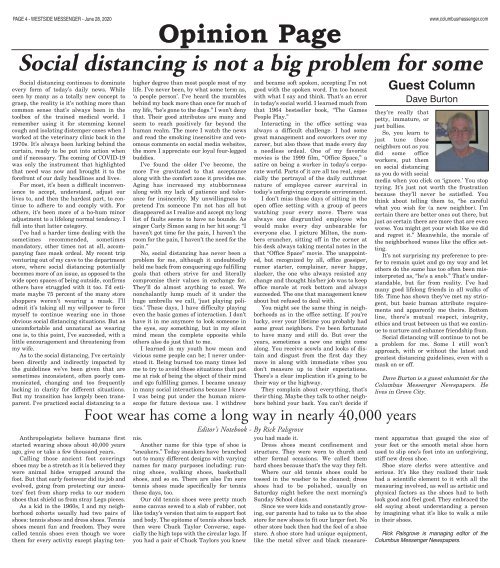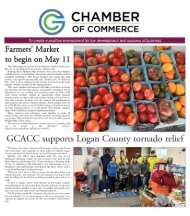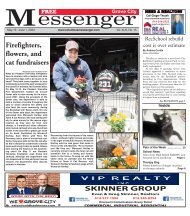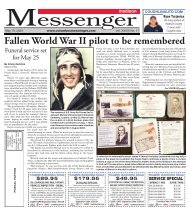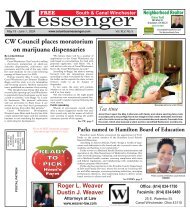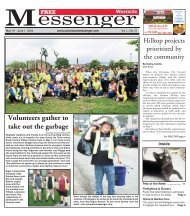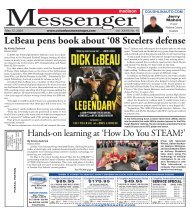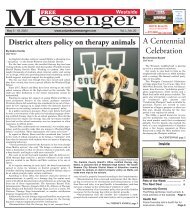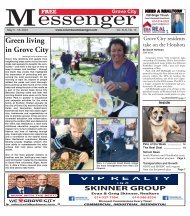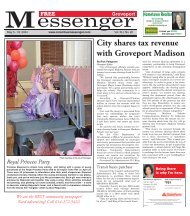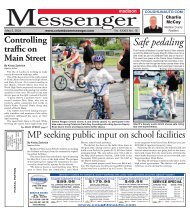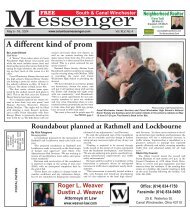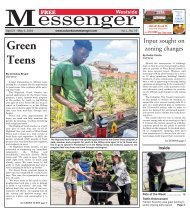Westside Messenger - June 28th, 2020
Create successful ePaper yourself
Turn your PDF publications into a flip-book with our unique Google optimized e-Paper software.
PAGE 4 - WESTSIDE MESSENGER - <strong>June</strong> 28, <strong>2020</strong><br />
Opinion Page<br />
www.columbusmessenger.com<br />
Social distancing is not a big problem for some<br />
Social distancing continues to dominate<br />
every form of today’s daily news. While<br />
seen by many as a totally new concept to<br />
grasp, the reality is it’s nothing more than<br />
common sense that’s always been in the<br />
toolbox of the trained medical world. I<br />
remember using it for stemming kennel<br />
cough and isolating distemper cases when I<br />
worked at the veterinary clinic back in the<br />
1970s. It’s always been lurking behind the<br />
curtain, ready to be put into action when<br />
and if necessary. The coming of COVID-19<br />
was only the instrument that highlighted<br />
that need was now and brought it to the<br />
forefront of our daily headlines and lives.<br />
For most, it’s been a difficult inconvenience<br />
to accept, understand, adjust our<br />
lives to, and then the hardest part, to continue<br />
to adhere to and comply with. For<br />
others, it’s been more of a ho-hum minor<br />
adjustment to a lifelong normal tendency. I<br />
fall into that latter category.<br />
I’ve had a harder time dealing with the<br />
sometimes recommended, sometimes<br />
mandatory, other times not at all, accompanying<br />
face mask ordeal. My recent trip<br />
venturing out of my cave to the department<br />
store, where social distancing potentially<br />
becomes more of an issue, as opposed to the<br />
wide open spaces of being outside, confirms<br />
others have struggled with it too. I’d estimate<br />
maybe 75 percent of the many store<br />
shoppers weren’t wearing a mask. I’ll<br />
admit it’s taking all my willpower to force<br />
myself to continue wearing one in those<br />
obvious social distancing situations. But as<br />
uncomfortable and unnatural as wearing<br />
one is, to this point, I’ve succeeded, with a<br />
little encouragement and threatening from<br />
my wife.<br />
As to the social distancing, I’ve certainly<br />
been directly and indirectly impacted by<br />
the guidelines we’ve been given that are<br />
sometimes inconsistent, often poorly communicated,<br />
changing and too frequently<br />
lacking in clarity for different situations.<br />
But my transition has largely been transparent.<br />
I’ve practiced social distancing to a<br />
higher degree than most people most of my<br />
life. I’ve never been, by what some term as,<br />
‘a people person’. I’ve heard the mumbles<br />
behind my back more than once for much of<br />
my life, “he’s gone to the dogs.” I won’t deny<br />
that. Their good attributes are many and<br />
seem to reach positively far beyond the<br />
human realm. The more I watch the news<br />
and read the smoking insensitive and venomous<br />
comments on social media websites,<br />
the more I appreciate our loyal four-legged<br />
buddies.<br />
I’ve found the older I’ve become, the<br />
more I’ve gravitated to that acceptance<br />
along with the comfort zone it provides me.<br />
Aging has increased my stubbornness<br />
along with my lack of patience and tolerance<br />
for insincerity. My unwillingness to<br />
pretend I’m someone I’m not has all but<br />
disappeared as I realize and accept my long<br />
list of faults seems to have no bounds. As<br />
singer Carly Simon sang in her hit song: “I<br />
haven’t got time for the pain, I haven’t the<br />
room for the pain, I haven’t the need for the<br />
pain.”<br />
No, social distancing has never been a<br />
problem for me, although it undoubtedly<br />
held me back from conquering ego fulfilling<br />
goals that others strive for and literally<br />
compromise their values in exchange for.<br />
They’ll do almost anything to excel. We<br />
nonchalantly lump much of it under the<br />
huge umbrella we call, ‘just playing politics.’<br />
These days, I have difficulty playing<br />
even the basic games of interaction. I don’t<br />
have it in me anymore to look someone in<br />
the eyes, say something, but in my silent<br />
mind mean the complete opposite while<br />
others also do just that to me.<br />
I learned in my youth how mean and<br />
vicious some people can be; I never understood<br />
it. Being burned too many times led<br />
me to try to avoid those situations that put<br />
me at risk of being the object of their mind<br />
and ego fulfilling games. I became uneasy<br />
in many social interactions because I knew<br />
I was being put under the human microscope<br />
for future devious use. I withdrew<br />
and became soft spoken, accepting I’m not<br />
good with the spoken word. I’m too honest<br />
with what I say and think. That’s an error<br />
in today’s social world. I learned much from<br />
that 1964 bestseller book, “The Games<br />
People Play.”<br />
Interacting in the office setting was<br />
always a difficult challenge. I had some<br />
great management and coworkers over my<br />
career, but also those that made every day<br />
a needless ordeal. One of my favorite<br />
movies is the 1999 film, “Office Space,” a<br />
satire on being a worker in today’s corporate<br />
world. Parts of it are all too real, especially<br />
the portrayal of the daily cutthroat<br />
nature of employee career survival in<br />
today’s unforgiving corporate environment.<br />
I don’t miss those days of sitting in the<br />
open office setting with a group of peers<br />
watching your every move. There was<br />
always one disgruntled employee who<br />
would make every day unbearable for<br />
everyone else. I picture Milton, the numbers<br />
cruncher, sitting off in the corner at<br />
his desk always taking mental notes in the<br />
that “Office Space” movie. The unappointed,<br />
but recognized by all, office gossiper,<br />
rumor starter, complainer, never happy,<br />
slacker, the one who always resisted any<br />
change and thought his/her job was to keep<br />
office morale at rock bottom and always<br />
succeeded. The one that management knew<br />
about but refused to deal with.<br />
You might see the same thing in neighborhoods<br />
as in the office setting. If you’re<br />
lucky, over your lifetime you probably had<br />
some great neighbors. I’ve been fortunate<br />
to have many and still do. But over the<br />
years, sometimes a new one might come<br />
along. You receive scowls and looks of distain<br />
and disgust from the first day they<br />
move in along with immediate vibes you<br />
don’t measure up to their expectations.<br />
There’s a clear implication it’s going to be<br />
their way or the highway.<br />
They complain about everything, that’s<br />
their thing. Maybe they talk to other neighbors<br />
behind your back. You can’t decide if<br />
Foot wear has come a long way in nearly 40,000 years<br />
Anthropologists believe humans first<br />
started wearing shoes about 40,000 years<br />
ago, give or take a few thousand years.<br />
Calling those ancient foot coverings<br />
shoes may be a stretch as it is believed they<br />
were animal hides wrapped around the<br />
foot. But that early footwear did its job and<br />
evolved, going from protecting our ancestors’<br />
feet from sharp rocks to our modern<br />
shoes that shield us from stray Lego pieces.<br />
As a kid in the 1960s, I and my neighborhood<br />
cohorts usually had two pairs of<br />
shoes: tennis shoes and dress shoes. Tennis<br />
shoes meant fun and freedom. They were<br />
called tennis shoes even though we wore<br />
them for every activity except playing tennis.<br />
Another name for this type of shoe is<br />
“sneakers.” Today sneakers have branched<br />
out to many different designs with varying<br />
names for many purposes including: running<br />
shoes, walking shoes, basketball<br />
shoes, and so on. There are also I’m sure<br />
tennis shoes made specifically for tennis<br />
these days, too.<br />
Our old tennis shoes were pretty much<br />
some canvas sewed to a slab of rubber, not<br />
like today’s version that aim to support foot<br />
and body. The epitome of tennis shoes back<br />
then were Chuck Taylor Converse, especially<br />
the high tops with the circular logo. If<br />
you had a pair of Chuck Taylors you knew<br />
Editor’s Notebook - By Rick Palsgrove<br />
Guest Column<br />
Dave Burton<br />
they’re really that<br />
petty, immature, or<br />
just bullies.<br />
So, you learn to<br />
just tune those<br />
neighbors out as you<br />
did some office<br />
workers, put them<br />
on social distancing<br />
as you do with social<br />
media when you click on ‘ignore.’ You stop<br />
trying. It’s just not worth the frustration<br />
because they’ll never be satisfied. You<br />
think about telling them to, “be careful<br />
what you wish for (a new neighbor). I’m<br />
certain there are better ones out there, but<br />
just as certain there are more that are even<br />
worse. You might get your wish like we did<br />
and regret it.” Meanwhile, the morale of<br />
the neighborhood wanes like the office setting.<br />
It’s not surprising my preference to prefer<br />
to remain quiet and go my way and let<br />
others do the same has too often been misinterpreted<br />
as, “he’s a snob.” That’s understandable,<br />
but far from reality. I’ve had<br />
many good lifelong friends in all walks of<br />
life. Time has shown they’ve met my stringent,<br />
but basic human attribute requirements<br />
and apparently me theirs. Bottom<br />
line, there’s mutual respect, integrity,<br />
ethics and trust between us that we continue<br />
to nurture and enhance friendship from.<br />
Social distancing will continue to not be<br />
a problem for me. Some I still won’t<br />
approach, with or without the latest and<br />
greatest distancing guidelines, even with a<br />
mask on or off.<br />
Dave Burton is a guest columnist for the<br />
Columbus <strong>Messenger</strong> Newspapers. He<br />
lives in Grove City.<br />
you had made it.<br />
Dress shoes meant confinement and<br />
structure. They were worn to church and<br />
other formal occasions. We called them<br />
hard shoes because that’s the way they felt.<br />
Where our old tennis shoes could be<br />
tossed in the washer to be cleaned; dress<br />
shoes had to be polished, usually on<br />
Saturday night before the next morning’s<br />
Sunday School class.<br />
Since we were kids and constantly growing,<br />
our parents had to take us to the shoe<br />
store for new shoes to fit our larger feet. No<br />
other store back then had the feel of a shoe<br />
store. A shoe store had unique equipment,<br />
like the metal silver and black measurement<br />
apparatus that gauged the size of<br />
your feet or the smooth metal shoe horn<br />
used to slip one’s foot into an unforgiving,<br />
stiff new dress shoe.<br />
Shoe store clerks were attentive and<br />
serious. It’s like they realized their task<br />
had a scientific element to it with all the<br />
measuring involved, as well as artistic and<br />
physical factors as the shoes had to both<br />
look good and feel good. They embraced the<br />
old saying about understanding a person<br />
by imagining what it’s like to walk a mile<br />
in their shoes.<br />
Rick Palsgrove is managing editor of the<br />
Columbus <strong>Messenger</strong> Newspapers.


